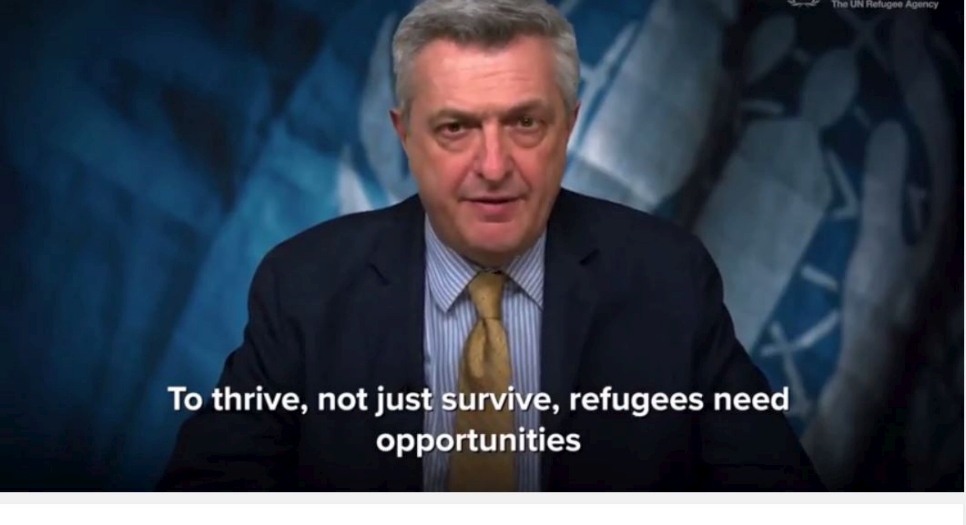Comprehensive Refugee Response Framework
Delivering more comprehensive and predictable responses for refugees
A vision of shared responsibility
As mass displacement across the world continues to grow, it is usually low- and middle-income countries that shoulder much of the responsibility for refugees. Meanwhile, the world’s response to large-scale movements remains inadequate and underfunded leaving refugees with an uncertain future. The New York Declaration lays out a vision for a more predictable and more comprehensive response to these crises, known as the Comprehensive Refugee Response Framework, or CRRF. It calls for greater support to refugees and the countries that host them.
Throughout 2017 and 2018, the CRRF was rolled out in diverse refugee situations across more than a dozen countries. Lessons drawn from the application of the CRRF helped to inform the Global Refugee Compact, which was affirmed by all UN Member States in December 2018.
More information on the Global Compact on Refugees
Why inclusion is key
At the heart of the CRRF and the GCR is the idea that refugees should be included in the communities from the very beginning. When refugees gain access to education and labour markets, they can build their skills and become self-reliant, contributing to local economies and fuelling the development of the communities hosting them. Allowing refugees to benefit from national services and integrating them into national development plans is essential for both refugees and the communities hosting them, and is consistent with the pledge to “leave no one behind” in the 2030 Agenda for Sustainable Development.
In the New York Declaration, Member States recognize that refugee camps “should be the exception,” and a temporary measure in cases of emergency. Instead, refugees should be allowed to live among host communities. By helping refugees thrive, not just survive, we can reduce the risk of protracted stays and lessen refugees’ dependence on humanitarian aid.
How to deliver this vision
To better support refugees and the communities hosting them the New York Declaration calls on UNHCR, the UN Refugee Agency, to work with a wide range of partners. These include not just governments, NGOs, refugees and other UN agencies, but also the private sector, international financial institutions and civil society, including think tanks, academia and faith leaders. Together, we aim to:
- Ease pressure on countries that welcome and host refugees
- Build self-reliance of refugees
- Expand access to resettlement in third countries and other complementary pathways
- Foster conditions that enable refugees voluntarily to return to their home countries.
The GCR envisions a world where refugees have access to countries where they are safe, where they are better included, where they are no longer living in camps, and are not dependent on humanitarian assistance only. Based on the New York Declaration, the Global compact on refugees recognizes that when refugees are given the chance, they can support themselves and their families, and make positive contributions to the communities hosting them. In this virtuous cycle, refugees and host communities mutually empower each other, socially and economically.
Looking ahead
 For more information on arrangements for follow-up and review of the Global compact, including on the Global Refugee Forum, please visit the Global Refugee Forum page.
For more information on arrangements for follow-up and review of the Global compact, including on the Global Refugee Forum, please visit the Global Refugee Forum page.
Public information documents
- Highlights of Progress Towards Comprehensive Refugee Responses Since the Adoption of the New York Declaration, August 2018
- Global CRRF Poster - September 2018
- Easy-to-Read Guide on the New York Declaration for Refugees and Migrants
- Quick Guide on New York Declaration for Refugees and Migrants
- The New York Declaration for Refugees and Migrants: Answers to Frequently Asked Questions
- Bringing the New York Declaration to Life: Applying the Comprehensive Refugee Response Framework
- CRRF poster – Africa, August 2018
- MIRPS poster – Americas, September 2018
Monthly CRRF Updates
Events and Speeches
- Oral update on the comprehensive refugee response framework, Mamadou Dian Baldé, Deputy Director for Comprehensive Responses, UNHCR
- Remarks to the Special Session on lessons learned and good practices in applying the comprehensive refugee response framework (CRRF), Daniel Endres, Director for Comprehensive Responses, UNHCR
- Remarks by Daniel Endres to the Panel discussion on the CRRF: "Collective Responses to Refugee situations: ensuring complementarity between humanitarian and development interventions: Lessons learned and recommendations from the roll out of the CRRF
- EVENT: The New York Declaration on Refugees and Migrants - One year on, New York, September 20th 2017
- Update on the practical roll-out of the CRRF – Address by the Director, Comprehensive Responses, at the Annual NGO Consultations, June 2017


